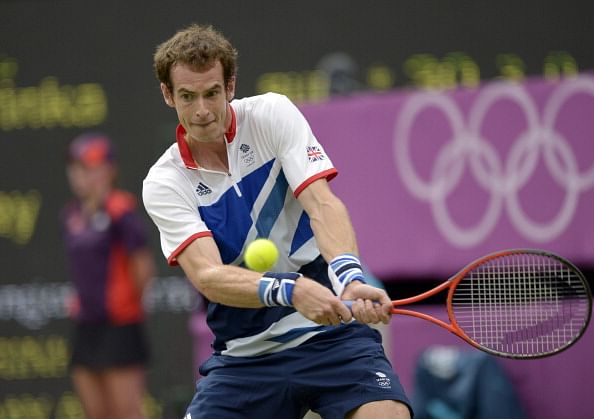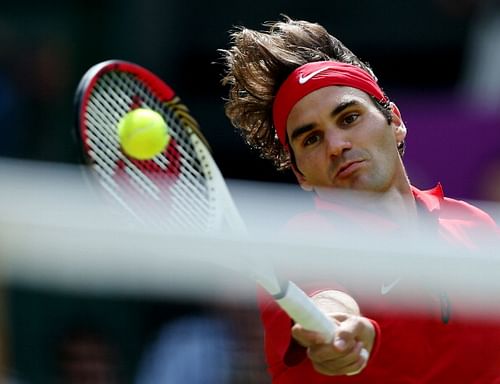
Reaching for the stars on a night destined for greatness

Now and again there comes a defining moment in sport, when the athlete is faced with the stark choice of consummating a lifetime of work or be consumed in the intense fire of the cathartic moment. Roger Federer and Andy Murray square off on the hallowed turf at the cathedral of tennis this evening – one man seeking to lift the collective burden of a nation, and another looking to add another important chapter to a journey laced with greatness.
A little later in the night, Usain Bolt will learn if he is destined for genuine greatness or to remain content with being an outstandingly brilliant sprinter whose moment was in the past. It is a night of concentrated action that promises unparalleled excitement, even as these extra-ordinary athletes venture to script their way into some of the most decorated leaves in the history of their respective sport.
Federer invites himself unapologetically into everything that has to do with the history of the game he plays with such ardent devotion and hunger even after years of unparalleled success. It would be a grave injustice if we allow numbers to determine the place of the Swiss genius among the pantheon of the greatest. Federer goes about his business with the grace of Nureyev causing an aesthetic experience that is far greater than any number can ever capture.
The world No.1 has been at the top of his game for the longest time ever, and won an unprecedented 17 Grand Slam trophies, but incredibly, there are a few things even he hasn’t accomplished – a singles medal at the Olympics is among them. Federer may not admit it publicly, but his capitulation to Nadal in six Grand Slam finals, and their one sided rivalry is something that is probably beyond redemption. And then there is his inability to make an impact on the Davis Cup.
But despite the glaring absence of glory in national colours, the Basel native needs no tutoring in the joy and honour of representing his country on the biggest sporting stage. The Swiss found solace in carrying the flag, and at winning the Gold Medal with Stanislas Wawrinka after a particularly tormented period of his illustrious career, when the Olympics came to his rescue in Beijing.
The Swiss has delighted in being a part of the Swiss contingent, but did not have much to show for his patriotic fervour except leading the contingent in at the last two Olympics. He finally put that right when he guaranteed himself a singles medal, when he outlasted Juan Martin Del Potro in the longest match in the history of the games. That should allow the Swiss genius to create a new master piece by reaching out into his treasure of experience and talent to seek the Gold medal that he believes will complete his collection.
That intense desire to fulfil his long cherished dream, in part, saw Federer eschew his predilection for wizardry by embracing the grind in his marathon battle against his younger Argentine opponent in the semi-finals. The effort underlined the intense desire in Federer to leave no stone unturned in his quest for Olympic glory, considering this could be his last realistic chance at it.

At the other end of the net is the local hero Andy Murray, who has done an exceptional job of holding together under mounting pressure, as he carries the hopes of his nation rather lightly on his shoulders. The Scot suffered a crushing emotional blow, when he lost to Federer four weeks ago at the same venue in the finals of Wimbledon.
Back at SW19, Murray has not just the chance to avenge that defeat but also to emancipate millions of British fans who have hungered for elusive glory for far longer than anyone might even care to remember. The British Isles have been a great source of sporting joy for people across the world, having contributed more than most in creating the many games that enthral us today. But despite being such prolific creators, they have time and again failed to capture glory at the highest levels.
Murray will also be inspired more than ever by the opportunity to corner Olympic honours at home. A victory for the Scot will also be a definitive moment in his career, blighted by the absence of a Grand Slam title thus far. He has plenty riding on the afternoon, and when he bring his bags to centre court on Sunday, at 1800hrs IST, Murray will once again shoulder the hopes of his starved community of fans.
Murray was dominant in his match against Novak Djokovic – his forehand was penetrating, pushing the Serbian into a state of constant defence while the power and trajectory of his strokes allowed Murray the space to create sharp angles or exhibit his touch at the net. Even the supremely fit Djokovic struggled as much as he did, to either retrieve the ball or just bring it back into play on the key points that mattered in their semi-finals. If Murray can bring the same pace and depth to his game on Sunday, he can start dictating the rallies against Federer, who can struggle when he is not allowed to find his rhythm early in the match.

And then there is the 100m dash for men. It is the most widely accepted expression for the human quest for speed. The world is on edge to witness the battle between Jamaican training partners Usain Bolt, the defending champion and Yohan Blake, the reigning world champion, supported by a bunch of equally talented Americans. Bolt’s iconic Beijing effort yielded him the 9.69s burst that he obliterated with an even better 9.59s run at the Berlin World Championships in 2009.
Bolt’s world fell apart when he invited disqualification at the finals of the World Championships in Daegu, and since then, a series of injuries have brought attention to the efforts of his compatriot Blake. Tyson Gay and Justin Gatlin have also improved significantly to create intense speculation about a difficult race for Lightning Bolt.
While his three chief rivals will look to exploit his weakness off the blocks, Bolt runs a now-or-never race to determine the extent of his greatness. No man since Carl Lewis in Seoul has successfully defended an Olympic 100m title, and a loss tonight for Bolt is bound to substantially alter the impact his career has when discussing the history of the short sprint.
These athletes, each a supreme exponent of his respective craft, will be writing on the gold plated leaves of modern athletic history even as they live those excruciating moments under the glare of a billion people. You might want to tell your grandchildren that you were witness to it all.